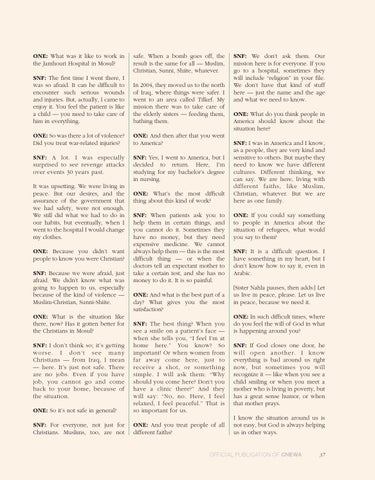ONE: What was it like to work in the Jamhouri Hospital in Mosul?
safe. When a bomb goes off, the result is the same for all — Muslim, Christian, Sunni, Shiite, whatever.
SNF: The first time I went there, I was so afraid. It can be difficult to encounter such serious wounds and injuries. But, actually, I came to enjoy it. You feel the patient is like a child — you need to take care of him in everything.
In 2004, they moved us to the north of Iraq, where things were safer. I went to an area called Tilkef. My mission there was to take care of the elderly sisters — feeding them, bathing them.
ONE: So was there a lot of violence? Did you treat war-related injuries?
ONE: And then after that you went to America?
SNF: A lot. I was especially surprised to see revenge attacks over events 30 years past.
SNF: Yes, I went to America, but I decided to return. Here, I’m studying for my bachelor’s degree in nursing.
It was upsetting. We were living in peace. But our desires, and the assurance of the government that we had safety, were not enough. We still did what we had to do in our habits, but eventually, when I went to the hospital I would change my clothes. ONE: Because you didn’t want people to know you were Christian? SNF: Because we were afraid, just afraid. We didn’t know what was going to happen to us, especially because of the kind of violence — Muslim-Christian, Sunni-Shiite. ONE: What is the situation like there, now? Has it gotten better for the Christians in Mosul?
ONE: What’s the most difficult thing about this kind of work? SNF: When patients ask you to help them in certain things, and you cannot do it. Sometimes they have no money, but they need expensive medicine. We cannot always help them — this is the most difficult thing — or when the doctors tell an expectant mother to take a certain test, and she has no money to do it. It is so painful. ONE: And what is the best part of a day? What gives you the most satisfaction?
ONE: So it’s not safe in general?
SNF: The best thing? When you see a smile on a patient’s face — when she tells you, “I feel I’m at home here.” You know? So important! Or when women from far away come here, just to receive a shot, or something simple. I will ask them: “Why should you come here? Don’t you have a clinic there?” And they will say: “No, no. Here, I feel relaxed, I feel peaceful.” That is so important for us.
SNF: For everyone, not just for Christians. Muslims, too, are not
ONE: And you treat people of all different faiths?
SNF: I don’t think so; it’s getting wo r se. I d o n’t see many Christians — from Iraq, I mean — here. It’s just not safe. There are no jobs. Even if you have job, you cannot go and come back to your home, because of the situation.
SNF: We don’t ask them. Our mission here is for everyone. If you go to a hospital, sometimes they will include “religion” in your file. We don’t have that kind of stuff here — just the name and the age and what we need to know. ONE: What do you think people in America should know about the situation here? SNF: I was in America and I know, as a people, they are very kind and sensitive to others. But maybe they need to know we have different cultures. Different thinking, we can say. We are here, living with different faiths, like Muslim, Christian, whatever. But we are here as one family. ONE: If you could say something to people in America about the situation of refugees, what would you say to them? SNF: It is a difficult question. I have something in my heart, but I don’t know how to say it, even in Arabic. [Sister Nahla pauses, then adds:] Let us live in peace, please. Let us live in peace, because we need it. ONE: In such difficult times, where do you feel the will of God in what is happening around you? SNF: If God closes one door, he will o p e n an o th e r. I k now everything is bad around us right now, but sometimes you will recognize it — like when you see a child smiling or when you meet a mother who is living in poverty, but has a great sense humor, or when that mother prays. I know the situation around us is not easy, but God is always helping us in other ways.
OFFICIAL PUBLICATION OF CNEWA
37
